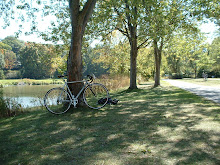
As mentioned over on my cycling blog, my brother and girlfriend and I are doing a team triathlon tomorrow morning. I'm doing the cycling portion, and even though it's short, I was thinking this afternoon that I really should try to eat some sort of a power-packed dinner tonight.
Traditionally you're supposed to eat pasta two nights before your race (that's how long it takes the carbs to turn themselves into energy that you can use). But, last night I totally forgot about eating properly, and in fact we were out drinking anyway.

So, for some energy, I decided to go with an old favourite tonight - curry. The recipe is pretty simple (leave some frying time between each of these steps):
a) cut and start frying an onion (one full onion)
b) add whatever veggies you want (peppers, cauliflower, mushrooms etc) Our recipe says about two cups worth, but it totally depends on how many people you're going to feed.
c) add in about four small spoonfulls of curry paste and fry for a while
d) drain and add a can of chickpeas
e) add a can of diced tomatoes, plus about 1 cup of water
f) add another four small spoonfulls of curry paste
g) let this big goopy mess heat slowly for 15 or 20 minutes. When a good amount of the water has evaporated, you're ready to go.

Usually we eat this on rice, but I decided to put it over some pasta. We sometimes buy this Farfalle stuff, which, very refreshingly, only has one ingredient - 100% durum wheat semolina.
Not really being able to cook, I'm not the type of veggie blogger who does the awesome posts full of gorgeous photos of recipes in process. So enjoy this meager attempt, these kinds of posts don't happen often around here. : )



